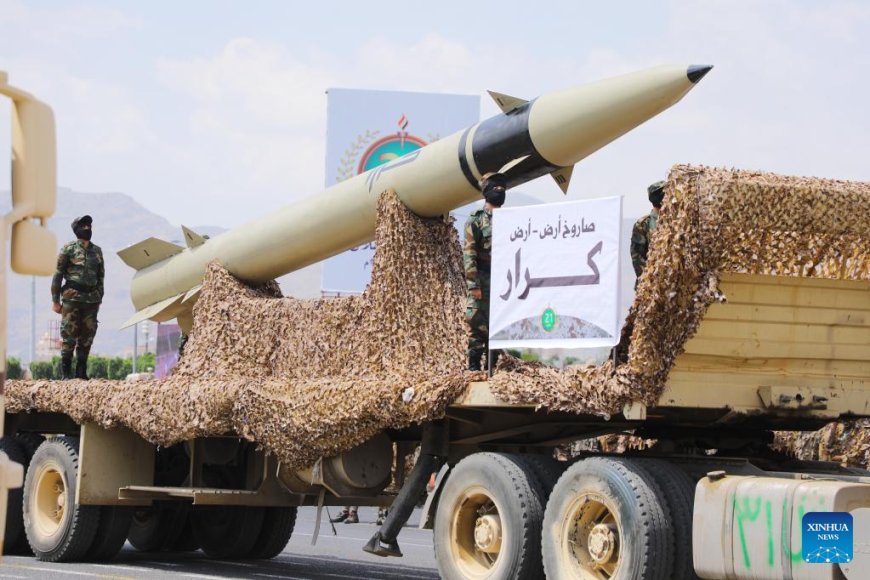Fear in the Skies: Yemen's Missiles Redefine the Balance of Power in the Middle East

On Sunday, September 15th, the Yemeni army employed a homegrown hypersonic missile to strike a military installation in the Yafa district of Tel Aviv. The Yemeni missiles evaded Israel's defense systems, traversing 2,040 kilometers in just 11 and a half minutes, instilling fear and panic to such an extent that, for the first time in Israel’s history, over two million settlers sought refuge in shelters. This represented the inaugural occasion on which Yemen's Ansarullah movement fired a series of long-range, precision-guided, radar-evading ballistic missiles, stunning the Israeli high command. The missiles effectively bypassed six anti-missile systems and targeted Tel Aviv, hitting areas near Ben Gurion Airport.
Following this unprecedented operation, Brigadier-General Yahya Sare'e, spokesperson for the Yemeni Armed Forces, declared that the strike constituted the fifth phase and the culmination of the Yemeni army's missile unit's endeavors, noting that the Yemeni army exerted considerable effort to enhance its missile technology to counter the Israeli regime. Sare'e added that the Yemeni ballistic missiles effectively destroyed their targets and evaded all tracking devices, including those of American and Israeli origin, on both land and sea.
Two months ago, the Yemenis launched a drone strike on Tel Aviv, following which the Israeli regime retaliated by attacking the port city of Hodeidah, which only motivated the Yemeni army to intensify its determination to fight back against Israeli aggression by formulating new strategies, as evidenced by the latest missile attack. Additionally, it underscored the Yemeni army's ballistic capabilities, which enable it to adeptly address the shortcomings of battle against the Israeli regime. Ansarullah claimed that this strike conveyed an important message respecting Yemen's steadfast support for the Palestinian people, a message that appears to persist to the detriment of the Israeli regime.
This military feat carries significant strategic implications.
a- Redefining regional dynamics: Despite facing severe sanctions and sieges, Yemen has achieved military self-sufficiency and advanced to the point where it can fire hypersonic missiles at Tel Aviv. Joint Western-Israeli defense systems protect Tel Aviv, yet Yemeni missiles successfully struck their targets, demonstrating the country's formidable military strength in regional calculations. Today, Yemen has become an indispensable player in the Red Sea, particularly the strategic Strait of Bab el-Mandab.
b- Humiliating Israel: The ballistic missiles fired by Yemen managed to breach Israel's extensive air defense systems and hit the heart of Palestinian occupied territories. In fact, the much-touted Israeli defense systems failed to intercept the Yemeni army’s hypersonic missile, despite firing over 25 defensive missiles in an attempt to intercept it. The Yemeni missile’s speed during its mid-phase reached 11,000 kilometers per hour, while in its final phase, this speed approached 20,000 kilometers per hour. Intercepting such a projectile is beyond the capability of any Western defense system.
c- A formidable response: Yemen’s commitment to the Axis of Resistance: After the attack on Hodeidah, Israeli media repeatedly claimed that Israel had taught the Yemenis an unforgettable lesson and that they would no longer engage with Israel. Despite the Yemenis’ continuous assertions that they would maintain their support for Palestine, the Israelis refused to believe this until the recent missile strike occurred. This attack reaffirmed Yemen’s commitment to the resistance axis and sent a strong message to the Israeli regime and its supporters to reconsider Iran's promise of retaliation. The operation made it clear that the resistance axis remains steadfast in its commitments.
d- From Yemen to Palestine: a unified stand against aggression: Following the missile strike, Sayyid Abdul-Malik Badreddin al-Houthi, leader of Yemen's Ansarullah movement, declared, "Our stance remains firm until the liberation of Palestine from the clutches of Israeli occupiers," emphasizing that as long as the aggression and blockade against Gaza persist, Yemen’s military operations will continue.













































